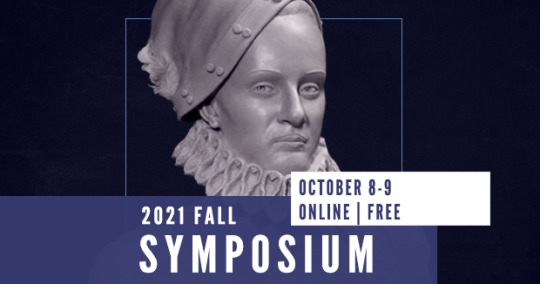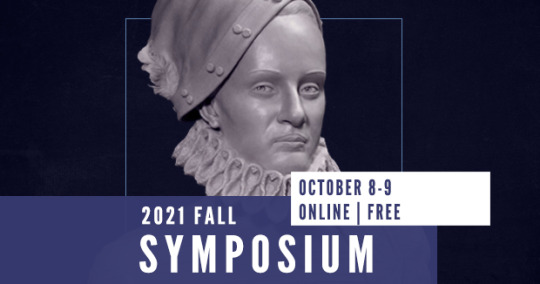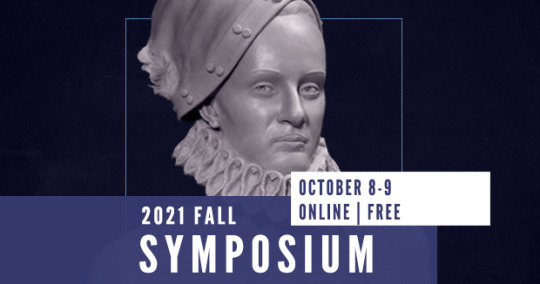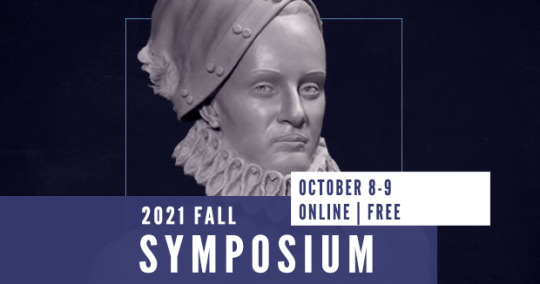#Bryan Wildenthal
Explore tagged Tumblr posts
Text
Registration Available for Fall Online Conference
Free registration is now available for the public online Symposium during the Shakespeare Oxford Fellowship’s 2021 Annual Conference. The Symposium will consist of three sessions held October 8–9 via Zoom (free software here). (SOF members will receive more information in September about the online Annual Meeting that will begin the Conference on October 2.) Register Now The Symposium will…

View On WordPress
#2021 Annual Conference#2021 Annual Meeting#Ben August#Bob Meyers#Bonner Miller Cutting#Bryan Wildenthal#Cheryl Eagan-Donovan#Dennis McCarthy#Don Rubin#Earl of Oxford#Earl Showerman#Edward de Vere#Elisabeth Waugaman#Fall 2021 Symposium#James Warren#John Shahan#Katherine Chiljan#Keir Cutler#Michael Blanding#Michael Delahoyde#Michael Dudley#North authorship theory#Oxfordian of the Year#Richard Waugaman#Roger Stritmatter#Shakespeare Oxford Fellowship#Thomas North#Video Contest#William Shakespeare
2 notes
·
View notes
Text
Even Small Weight Gain Is Bad for the Heart
Even Small Weight Gain Is Bad for the Heart
Modest weight gains – even among those who aren’t overweight – can cause dangerous changes to the heart, but small amounts of weight loss can improve the condition, new research from UT Southwestern Medical Center cardiologists shows.
The report, published in the Journal of the American Heart Association, found that weight increases of as little as 5 percent can result in a remodeling of the heart
View On WordPress
#Assistant Professor#Bryan Wilner#Christopher Maroules#Faculty Associate Dr#heart#Kern Wildenthal#Medicine#obesity#Sonia Garg#UT
0 notes
Text
The dangers of hidden fat: Exercise is your best defense against deep abdominal fat
Scientists know that the type of fat you can measure with a tape isn't the most dangerous. But what is the most effective way to fight internal, visceral fat that you cannot see or feel? The answer: exercise.
Researchers at UT Southwestern Medical Center analyzed two types of interventions -- lifestyle modification (exercise) and pharmacological (medicine) -- to learn how best to defeat fat lying deep in the belly. The study is published in Mayo Clinic Proceedings.
"Visceral fat can affect local organs or the entire body system. Systemically it can affect your heart and liver, as well as abdominal organs," said senior author and cardiologist Dr. Ian J. Neeland, Assistant Professor of Internal Medicine. "When studies use weight or body mass index as a metric, we don't know if the interventions are reducing fat everywhere in the body, or just near the surface."
To find out, the researchers evaluated changes in visceral fat in 3,602 participants over a 6-month period measured by a CT or MRI exam. Both exercise and medicines resulted in less visceral fat, but the reductions were more significant per pound of body weight lost with exercise.
"The location and type of fat is important. If you just measure weight or BMI, you can underestimate the benefit to your health of losing weight," said Dr. Neeland, a Dedman Family Scholar in Clinical Care. "Exercise can actually melt visceral fat."
Participants in exercise trials were 65 percent female, with a mean age of 54 and mean BMI at enrollment of 31. Exercise regimens were monitored, not self-reported. The majority of exercise trials were performed in the U.S. and Canada, while pharmacologic trials included the U.S., Canada, Sweden, Japan, and four multinational cohorts.
The medications used by study participants were FDA approved or in the FDA approval pipeline.
According to the Centers for Disease Control and Prevention, obesity affects nearly 40 percent of adult Americans. Dr. Neeland said researchers previously thought of fat as inert storage, but over the years this view evolved and fat is now seen as an active organ. "Some people who are obese get heart disease, diabetes, or metabolic syndrome -- and others don't," Dr. Neeland said. "Our study suggests that a combination of approaches can help lower visceral fat and potentially prevent these diseases."
Other UT Southwestern researchers who contributed to this work include Dr. Shreya Rao, cardiology fellow; Dr. Ambarish Pandey, Assistant Professor of Internal Medicine; Dr. Bryan Park, internal medicine resident; Helen Mayo, Faculty Associate; Dr. Dharam Kumbhani, Associate Professor of Internal Medicine; and Dr. James A. de Lemos, Professor of Internal Medicine. Dr. de Lemos holds the Sweetheart Ball-Kern Wildenthal, M.D., Ph.D., Distinguished Chair in Cardiology.
Story Source:
Materials provided by UT Southwestern Medical Center. Note: Content may be edited for style and length.
Source: https://www.sciencedaily.com/releases/2019/02/190201081459.htm
0 notes
Photo

Go follow that there library instagram y’all. ✌️🤟🤘 #Repost @srsulibrary ・・・ Big Jenga on the first floor 🆒🆒🆒 (at SRSU Bryan Wildenthal Memorial Library)
0 notes
Text
SOF's Successful Summer Seminar in Ashland, Oregon 2019
SOF’s Successful Summer Seminar in Ashland, Oregon 2019
Poster for Public Forum
Shakespeare Oxford Fellowship sponsored its third Shakespeare Authorship Summer Seminar in Ashland, Oregon, from Monday, July 22 to Friday, July 26, 2019. This year’s program attracted almost 50 participants, who gathered together over a five-day span of presentations and three evenings of plays. The focus of this year’s seminar was on the Shakespeare plays in production…
View On WordPress
#17th Earl of Oxford#Ashland#Ashland Tidings#authorship question#Bonner Cutting#Bryan Wildenthal#Earl of Oxford#Earl Showerman#Edward de Vere#Hamlet#Hannon Library#Oregon#Oregon Shakespeare Festival#Roger Stritmatter#Shakespeare Oxford Fellowship#Shelly Maycock#Southern Oregon University#Steven Sabel#Summer Seminar#William Shakespeare
1 note
·
View note
Text
SOF Summer Seminar, Ashland, Oregon, July 22-25, 2019
SOF Summer Seminar, Ashland, Oregon, July 22-25, 2019
The Shakespeare Oxford Fellowship is sponsoring a summer seminar in Ashland, Oregon July 22 through 25, 2019 focused on three plays in production at the Oregon Shakespeare Festival (OSF), As You Like It, All’s Well that Ends Well, and Macbeth. Authors of recent Shakespeare authorship publications will also be featured. The seminar will take place in the beautiful Meese Room at Hannon Library on…
View On WordPress
#17th Earl of Oxford#All&039;s Well That Ends Well#As You Like It#Ashland Oregon#authorship question#Bonner Miller Cutting#Bryan Wildenthal#Earl of Oxford#Earl Showerman#Macbeth#Oregon Shakespeare Festival#Roger Stritmatter#Shakespeare Authorship Question#Shakespeare Oxford Fellowship#Shelly Maycock#Southern Oregon University#Steven Sabel#William Shakespeare
1 note
·
View note
Text
Authorship Question Dominates Front Page of Santa Barbara Newspaper
Authorship Question Dominates Front Page of Santa Barbara Newspaper
Front page, Santa Barbara News-Press, Feb. 11, 2019
The front page of the February 11 issue of the Santa Barbara News-Pressfeatures a huge picture of Edward de Vere, 17th Earl of Oxford, above the fold with the caption, “TO BE OR NOT TO BE . . . THAT’S NORMALLY THE QUESTION.’ Under that is a picture of the Stratford man with the caption, “BUT IS HE OR ISN’T HE IS NOW A GROWING QUESTION.” The…
View On WordPress
#17th Earl of Oxford#authorship question#Bryan Wildenthal#Earl of Oxford#Edward de Vere#Hamlet#Karpeles Manuscript Library Museum#Marilyn McMahon#Norman Cohan#Santa Barbara News-Press#Shakespeare#Shakespeare Authorship Question#Shakespeare Oxford Fellowship#Steven Sabel#William Cecil#William Shakespeare
1 note
·
View note
Text
Fall Symposium Starts in Two Days: Held on Zoom
The public Symposium of the SOF Fall 2021 Annual Conference takes place on Zoom this Friday and Saturday, October 8 and 9. Read all about it and register here if you haven’t already. It’s free but registration is required. The Symposium, hosted online from three locations in the United States and Canada, will feature the winners of the 2021 “Who Wrote Shakespeare?” Video Contest, the recipient of…

View On WordPress
#2021 Annual Conference#Ben August#Bob Meyers#Bryan Wildenthal#Cheryl Eagan-Donovan#Cleopatra#Decameron#Declaration of Reasonable Doubt#Dennis McCarthy#Don Rubin#Earl of Oxford#Earl Showerman#Edward de Vere#Elisabeth Waugaman#Fall 2021 Fundraising Appeal#Fall 2021 Symposium#James Warren#John Shahan#Katherine Chiljan#Keir Cutler#Michael Blanding#Michael Delahoyde#Michael Dudley#North authorship theory#North by Shakespeare#Oxfordian of the Year#Richard Waugaman#Roger Stritmatter#Shakespeare Authorship Coalition#Shakespeare Oxford Fellowship
0 notes
Text
Upcoming Zoom Symposium: Registration Still Open
Excitement is building around the Zoom Symposium scheduled for Friday and Saturday, October 8 and 9: the public highlight of the Shakespeare Oxford Fellowship’s 2021 Annual Conference. Please read all about it and register here if you haven’t already. It’s free! The Symposium, hosted online from three locations in the United States and Canada, will feature the winners of the 2021 “Who Wrote…

View On WordPress
#2021 Annual Conference#Ben August#Bob Meyers#Bryan Wildenthal#Cheryl Eagan-Donovan#Cleopatra#Decameron#Declaration of Reasonable Doubt#Dennis McCarthy#Don Rubin#Earl of Oxford#Earl Showerman#Edward de Vere#Elisabeth Waugaman#Fall 2021 Fundraising Appeal#Fall 2021 Symposium#James Warren#John Shahan#Katherine Chiljan#Keir Cutler#Michael Blanding#Michael Delahoyde#Michael Dudley#North authorship theory#North by Shakespeare#Oxfordian of the Year#Richard Waugaman#Roger Stritmatter#Shakespeare Authorship Coalition#Shakespeare Oxford Fellowship
0 notes
Text
Zoom Conference Preview: Leading Scholars, North-Oxford Panel, and Authorship 101
Annual Meeting for SOF Members on Oct. 2; Free Symposium Oct. 8–9 Will Showcase Video Contest Winners, Tom Regnier Veritas Award, and Oxfordian of the Year The 2021 SOF Annual Conference will be highlighted by more than a dozen speakers from across North America, including a panel with authors Michael Blanding, Dennis McCarthy, Prof. Bryan H. Wildenthal, and Bob Meyers on the claim by McCarthy —…

View On WordPress
#2021 Annual Conference#2021 Annual Meeting#Ben August#Bob Meyers#Bryan Wildenthal#Cheryl Eagan-Donovan#Cleopatra#Decameron#Declaration of Reasonable Doubt#Dennis McCarthy#Don Rubin#Earl of Oxford#Earl Showerman#Edward de Vere#Elisabeth Waugaman#Fall 2021 Fundraising Appeal#Fall 2021 Symposium#fundraiser#James Warren#John Shahan#Katherine Chiljan#Keir Cutler#Membership Appeal#Michael Blanding#Michael Delahoyde#Michael Dudley#North authorship theory#North by Shakespeare#Oxfordian of the Year#Richard Waugaman
0 notes
Text
In Memoriam: Justice John Paul Stevens
In Memoriam: Justice John Paul Stevens
by Tom Regnier
Justice John Paul Stevens
We in the Shakespeare Oxford Fellowship note with great sadness and enormous respect the passing of retired Supreme Court Justice John Paul Stevens (1920-2019), who was our Oxfordian of the Year in 2009. Justice Stevens was also a “notable signatory” of the Declaration of Reasonable Doubt About the Identity of William Shakespeare.
Justice Stevens was…
View On WordPress
#17th Earl of Oxford#Alex McNeil#authorship question#Bryan H. Wildenthal#Declaration of Reasonable Doubt#Earl of Oxford#Edward de Vere#Hamlet#Justice John Paul Stevens#Shakespeare#Shakespeare Oxford Fellowship#Tom Regnier#U. S. Supreme Court#William Shakespeare
1 note
·
View note
Text
New Book Explores Early Doubts about Shakespeare's Authorship
New Book Explores Early Doubts about Shakespeare’s Authorship
Professor Bryan H. Wildenthal
Professor Bryan H. Wildenthal has published a landmark new book, Early Shakespeare Authorship Doubts. The book refutes the commonly heard Stratfordian claim that nobody entertained any doubts about authorship until hundreds of years after the death of William Shakspere of Stratford-upon-Avon (1564-1616), the actor and businessman conventionally credited as the…
View On WordPress
#Alexander Waugh#authorship question#Bryan H. Wildenthal#Contested Will#Diana Price#Earl of Oxford#Edward de Vere#James Shapiro#Katherine Chiljan#Roger Stritmatter#Shakespeare#Shakespeare Authorship Question#Shakespeare Oxford Fellowship#William Shakespeare
1 note
·
View note
Text
The Oxfordian Turns 22, Showcases Scholarly Breakthroughs
The Oxfordian Turns 22, Showcases Scholarly Breakthroughs
Newest Annual Volume Notes Major Academic Inroads by Oxfordian Scholars and Shows That Shakespeare’s First Play Dates to the 1560s
September 15, 2020 — The latest issue of the Shakespeare Oxford Fellowship’s peer-reviewed scholarly journal, The Oxfordian, has been published. The 22nd annual volume is 190 pages long, contains 13 new research papers, essays, and book reviews, and is illustrated…
View On WordPress
#13th Earl of Oxford#15th Earl of Oxford#16th Earl of Oxford#17th Earl of Oxford#Ben Jonson#Bryan Wildenthal#calgreyhounds#Centennial#Chris Pannell#Coppin State University#Cornell University Press#Don Rubin#Donald Ostrowski#Edward de Vere#Famous Victories of Henry the Fifth#First Folio#Gary Goldstein#Guernica#Harvard Extension School#Harvard University#Henry IV#Henry V#Hermogenes#J. Thomas Looney#James Warren#Kevin Gilvary#McFarland#Michael Dudley#Michael Egan#Michael Hyde
0 notes
Text
Symposium Update: Harvard Lecturer Ostrowski to Speak
Symposium Update: Harvard Lecturer Ostrowski to Speak
by Bryan H. Wildenthal
August 28, 2020 — The SOF is pleased to announce an exciting new addition to the lineup of speakers during the free online Shakespeare Authorship Symposium on October 2–3, 2020.
Donald Ostrowski, Ph.D., historian and lecturer at Harvard Extension School
Donald Ostrowski, Ph.D., a distinguished historian and lecturer in Harvard University’s Extension School, will present a…
View On WordPress
#Bryan Wildenthal#Centennial#Cheryl Eagan-Donovan#Cornell University Press#Donald Ostrowski#Earl Showerman#Early Shakespeare Authorship Doubts#Harvard Extension School#Harvard University#historians#history of authorship controversies#J. Thomas Looney#James Warren#Katherine Chiljan#Looney Centennial#Lord Prospero Visconti#Mark Alexander#memorial#Mentors to Genius#Northern Illinois University Press#Oxfordian Centennial#Oxfordian of the Year#Prospero#Ramon Jiménez#Shakespeare Auteur#Shakespeare Beyond Science#Shakespeare Identified#Sky Gilbert#Steven Sabel#Stratfordian Blind Spots
0 notes
Text
SOF Sets Online Symposium for October 2–3
August 7, 2020 — The Shakespeare Oxford Fellowship will hold a free online Shakespeare Authorship Symposium on Friday and Saturday, October 2–3, 2020. The event will be live-streamed on the SOF YouTube channel, replacing the annual conference in Ashland, Oregon, now postponed to Fall 2021 due to the coronavirus pandemic.
Tom Regnier at the 2019 SOF conference at the Mark Twain House and Museum,…
View On WordPress
#Ben August#Bryan Wildenthal#Centennial#Cheryl Eagan-Donovan#coronavirus#Don&039;t Quill the Messenger#Earl Showerman#Early Shakespeare Authorship Doubts#Fall Conference#J. Thomas Looney#Jake Lloyd#James Warren#Katherine Chiljan#Lord Prospero Visconti#Mark Alexander#memorial#Mentors to Genius#Online#Oxfordian of the Year#pandemic#Prospero#Ramon Jiménez#Shakespeare Auteur#Shakespeare Beyond Science#Shakespeare Identified#SI-100#Sky Gilbert#SOF Conference#Steven Sabel#Stratfordian Blind Spots
0 notes
Text
Tom Woosnam: How I Became an Oxfordian
June 27, 2020
Tom Woosnam was born in England where he received his B.Sc. in physics from Imperial College, London. He has lived in the U.S. since 1975 and taught high school physics and math before retiring with his wife Julia to Ashland, Oregon, in 2019. His avocation is acting. He has performed in over 50 amateur and professional productions, including eight Oxfordian plays.
In a word —…
View On WordPress
#Alexander Waugh#authorship question#Bob Meyers#Bonner Miller Cutting#Bryan Wildenthal#Charlton Ogburn#Deficit Myth#Don&039;t Quill the Messenger#Earl of Oxford#Earl Showerman#Edward de Vere#Henri Poincare#J. Thomas Looney#John Shahan#Kevin Gilvary#Mark Anderson#Oxfordian theory#physics#Roger Stritmatter#Shakespeare Beyond Doubt#Stephanie Kelton#Steven Sabel#Tom Regnier#Tom Woosnam#William Shakespeare
0 notes